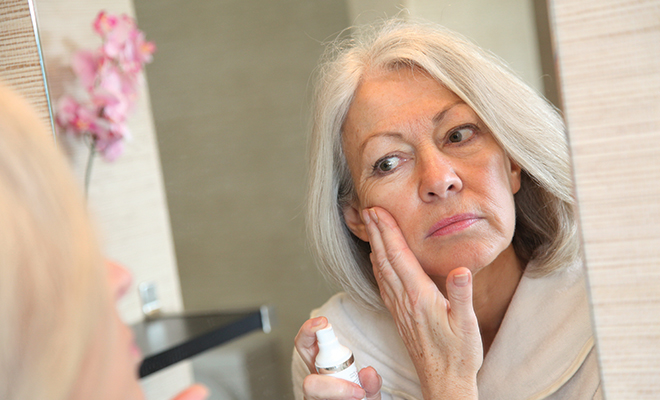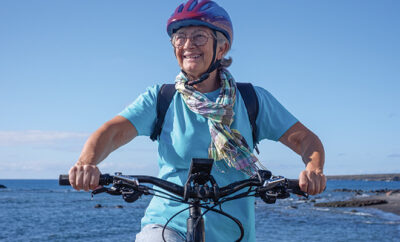
Understanding Aging Skin: Know What to Expect
As we age, changes occur to our bodies that can affect how they react and work. Taking care of the largest organ in our body–our skin–is always important. However, as we age, it becomes even more of a priority, and adopting a skin care routine is even more vital to our overall health.
Although everyone ages differently, as one approaches her 60s and 70s, certain skin issues can arise. The skin becomes drier, thinner and less supple. It may develop more age spots, wrinkles and creases and appear blotchier. Irritated easily, it can be more susceptible to bruising and skin infections. Healing can take longer than it did in one’s younger years.
Aging adults are prone to myriad skin conditions, some of which can be quite serious, from scaling, itching and mild dryness to infections and ulcerations. Some infections or non-healing wounds can be fatal. Overall, older adults need to attend to their aging skin with great care. Because it is prone to thinning and dryness, it is vulnerable to cracking and dermatitis. This creates a breeding ground for bacteria that can then result in infection.
Of great concern to older adults is the potential for cancerous and noncancerous skin growths. Your risk of developing skin cancer increases around the age of 50, and that risk intensifies the older you become, and it’s important to see a dermatologist regularly to examine your skin and look for signs of cancer. When skin cancer is detected early and removed, that may be the only treatment you need. While most growths are not cancerous, it is best to exercise caution.
When you’re in the sun, be sure to use a broad-spectrum, water-resistant sunscreen with an SPF of at least 30 every day. Apply this to all skin not covered by clothing. It is equally important to wear sunscreen even if you’re just sitting in the car.
When bathing, replace bar soap with a gentle, creamy and fragrance-free cleanser. Use warm water, as hot water can strip the skin of its natural oils, which can lead to increased dryness. Avoid taking long or frequent baths or showers, too, aiming for just ten minutes each time. After bathing, gently pat water from your skin. If you leave a bit of water on your skin, it can help the moisturizer hydrate the skin. Keeping your skin hydrated, whether through gentle moisturizers or drinking appropriate amounts of water, is critical to taking care of your skin as you age. Be careful with perfumes, colognes and various skin care products; the fragrances they contain can irritate your skin, resulting in dry, itchy skin.
If you enjoy working in the garden and/or around the house, be sure to wear gloves. The products you use while gardening or doing housework may contain harsh chemicals, which can irritate or dry your skin. Further, being outside in the sun increases your chances of getting skin cancer.
Heating and air conditioning can pull humidity from the air, leading to dry and itchy skin. If the air feels dry, use a humidifier and keep your indoor humidity between 45 percent and 60 per cent. A hygrometer, purchased from your local hardware store, can help you determine the level of humidity in the air.
Be sure to change your clothes, sheets and sanitary products regularly. This is critical if someone is bedridden. It’s also important to turn bedridden individuals frequently to avoid the formation of bed sores and pressure-sensitive ulcers.
Finally, below-the-skin changes contribute to the aging we see in our faces. A natural part of aging, this can result in loss of fat below the skin in the cheeks, temples, chin, nose and eye area, creating a skeletal appearance. Loss of elasticity causes drooping of the eyebrows and eyelids, a double chin and even lengthening of the ear lobes.
For any skin conditions about which you may have concerns, please see your health care provider to determine the cause and discuss potential treatment options. ■
Sources: parentgiving.com, aad.org and caringpeopleinc.com.
Common skin conditions affecting older adults
• Stasis dermatitis is a common condition that results in dry, itchy skin. This tends to affect women more than men. Older adults typically sweat less as well, which is a contributing factor to dry skin in advancing years.
• Senile purpura presents as purplish spots typically on the arms and legs and is the result of thin skin, frail capillaries and blood vessels just under the surface of the skin.
• Bacterial infections and parasitic infections can arise, which include scabies and ringworm.
• Exfoliative dermatitis is a severe form of dermatitis involving excessive shedding and peeling of the skin. This can lead to severe itching, which can result in infection from scratching.
• Shingles is a common viral skin disorder that can present later in life. The Shingrix vaccine can help prevent a painful outbreak. ■







